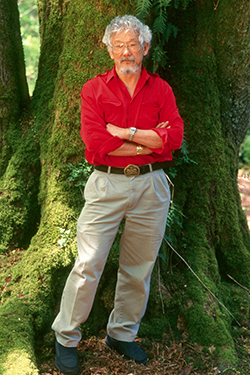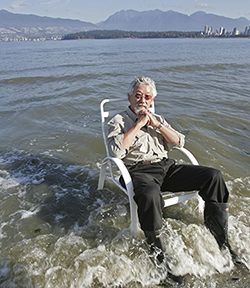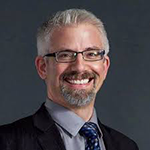Mathieu: Today we are talking about how and why family relationships are so important, so foundational to inspiring environmental stewardship in our children and grandchildren. We are very honored to be interviewing Dr. David Suzuki. Thank you, sir, for taking time out of your busy schedule to speak with us today.
Dr. Suzuki: My pleasure!
Mathieu: So, in your autobiography you recount how influential your father, Kaoru Carr Suzuki, was in connecting you with the natural world of your youth. Would you recount a story that best illustrates how your father inspired this for you?
 Dr. Suzuki: My father, himself being the son of immigrants, dad was born in Vancouver, for some reason he loved nature. He loved fishing, he loved gardening and that was very unusual because as you know, when immigrants come to this country, they are generally concerned about security, making money, getting a house and all of that. Dad, as the eldest in a family of seven children, was expected to be a role model, and yet he loved to go camping, fishing, and hiking. His dad was always giving him heck; my grandfather was always balling my father out. He would say, why did you take David fishing on Saturday? You could have been working and making money. I used to call my father a mutant. I said dad you must be a mutant. I mean you’re so different from the rest of the family. Anyway, for me that translated in to a very great fortune because my earliest memory from childhood, when I was four, and dad took me down to a store where we were buying a tent, and I remember vividly the excitement of buying this little pup tent, because we set it right up on the wooden floor of this store, and dad and I crawled in to it. I just remember he put his arms around me, and it was just so delicious because I was so excited about going camping. And from that moment on my earliest memories of childhood in British Columbia are of going with dad, hiking up mountains and going fishing. That really shaped the passions that I have right through my entire life.
Dr. Suzuki: My father, himself being the son of immigrants, dad was born in Vancouver, for some reason he loved nature. He loved fishing, he loved gardening and that was very unusual because as you know, when immigrants come to this country, they are generally concerned about security, making money, getting a house and all of that. Dad, as the eldest in a family of seven children, was expected to be a role model, and yet he loved to go camping, fishing, and hiking. His dad was always giving him heck; my grandfather was always balling my father out. He would say, why did you take David fishing on Saturday? You could have been working and making money. I used to call my father a mutant. I said dad you must be a mutant. I mean you’re so different from the rest of the family. Anyway, for me that translated in to a very great fortune because my earliest memory from childhood, when I was four, and dad took me down to a store where we were buying a tent, and I remember vividly the excitement of buying this little pup tent, because we set it right up on the wooden floor of this store, and dad and I crawled in to it. I just remember he put his arms around me, and it was just so delicious because I was so excited about going camping. And from that moment on my earliest memories of childhood in British Columbia are of going with dad, hiking up mountains and going fishing. That really shaped the passions that I have right through my entire life.
Mathieu: Your dad sounds like he was very supportive of all your efforts as you grew up.
Dr. Suzuki: He was my role model and I just followed along with him.
Mathieu: That’s excellent. And as you became a father and then a grandfather, especially as you became a grandfather, did it change your views of how you relate to your kids and your grand kids?
Dr. Suzuki: Being a father was the biggest shock of my life. I was married and I thought okay, when I get my Ph.D. and a get a job in a university, then maybe we’ll start a family. It was something way in the future. We surprisingly got pregnant and when my daughter was born, it was just the most incredible experience of my life. Being a father was the greatest thing I had ever experienced. I loved being a father and of course the joy of being a father is that your role models have shaped you, like my father was my great role model. Camping in the outdoors was what I enjoyed. So of course my children, from the time they were infants, literally 3 or 4 months, we were taking them out camping and hiking, so I just passed that on. But having grandchildren was unbelievable! As I say, I thought being a father was the greatest thing in life, but being a grandfather really does change you, because your relationship is different. When you are with your children you are living together 24 hours a day, and there are times when you get pissed off at each other – they get mad. But with grandchildren your time is more limited and they absolutely adore you. They don’t see your faults or weaknesses, they just think you’re wonderful, and I can just spoil the hell out of them and then of course hand them back to their mom and dad at the end of the day.
Mathieu: Oh, that s fun!
Dr. Suzuki: Of course at my age, being an elder and having grandchildren, I am desperate about their futures. I don’t think that we as a society think very much about what kind of world we are leaving to our grandchildren
Mathieu: That leads to a question I had. What’s your greatest hope for the future generation in the face of the approaching environmental challenges we have?
Dr. Suzuki: Well, it’s interesting. I’m touring Canada right now with an economist, a man named Jeff Rubin, who was a senior economist with the CIBC, and he’s just written a book called The End of Growth, and he argues on purely economic grounds that growth is coming to an end in the economy. Now, as an environmentalist I have argued for years that there have to be limits to growth because we live in the finite world, and you can’t grow an economy forever. But here’s an economist saying for economic reasons we are at the end of growth, and that is an opportunity then to really discuss what kind of a society are we. If we go in to a no growth society, how are we going to live? My hope is that people are going to think much more about future generations. Right now the political and corporate agendas, children or grandchildren or future generations are just not on the agenda, because they have a much shorter vision. I want society, and I hope society, will be thinking much more of the future, not just our current time.
Mathieu: And how would you, talking to grandparents out there, how would you tell them to inspire their own grand kids to think about environmental concerns.
 Dr. Suzuki: I am telling elders now get the hell off the golf course or off the couch. You, as elders, have something no other group in society has, and that is that you have lived an entire life, you’ve had experiences, you’ve had successes, and you’ve had failures. Now is the important time when you can comb through your life experiences and derive the nuggets of information that you’ve learned as a result of that and tell young people what you have learned in your lifetime. I think its really important elders remember what life was when they were younger. When you talk to young people about the end of growth, they get really freaked out. They say, oh, what does that mean? Are we going to have to go back and live in a cave? And I say, hey, don’t have to go back that far……how about 1950. I grew up as a kid in 1950, before there was any television, before there was jet travel, before there were satellites or computers or cell phones, and guess what, we had a pretty good way of living, it was great. And we need elders to talk about what can be, because of what once was. My big elder, my father…….I moved in to take care of him in the last month of his life, and it was a wonderful time. We laughed and we cried, talked and reminisced, and you know in all that time he never once said, gee, remember that fancy closet of clothes I had, or the big car I bought or the house we owned: that was just stuff. He kept saying, “David, I die a rich man”. Now he didn’t mean rich in terms of money. All we talked about in that last month were family, friends, and neighbors, and the things that we did together. That was my father’s wealth. It was human relationships and human experiences. And that told me so clearly money and stuff are absolutely unimportant. When you come to the end of your life and you say what you’re proud of or what you’re pleased you did in you life, it ain’t about ‘I made a million bucks’ or ‘I bought a fancy car’: it’s about people.
Dr. Suzuki: I am telling elders now get the hell off the golf course or off the couch. You, as elders, have something no other group in society has, and that is that you have lived an entire life, you’ve had experiences, you’ve had successes, and you’ve had failures. Now is the important time when you can comb through your life experiences and derive the nuggets of information that you’ve learned as a result of that and tell young people what you have learned in your lifetime. I think its really important elders remember what life was when they were younger. When you talk to young people about the end of growth, they get really freaked out. They say, oh, what does that mean? Are we going to have to go back and live in a cave? And I say, hey, don’t have to go back that far……how about 1950. I grew up as a kid in 1950, before there was any television, before there was jet travel, before there were satellites or computers or cell phones, and guess what, we had a pretty good way of living, it was great. And we need elders to talk about what can be, because of what once was. My big elder, my father…….I moved in to take care of him in the last month of his life, and it was a wonderful time. We laughed and we cried, talked and reminisced, and you know in all that time he never once said, gee, remember that fancy closet of clothes I had, or the big car I bought or the house we owned: that was just stuff. He kept saying, “David, I die a rich man”. Now he didn’t mean rich in terms of money. All we talked about in that last month were family, friends, and neighbors, and the things that we did together. That was my father’s wealth. It was human relationships and human experiences. And that told me so clearly money and stuff are absolutely unimportant. When you come to the end of your life and you say what you’re proud of or what you’re pleased you did in you life, it ain’t about ‘I made a million bucks’ or ‘I bought a fancy car’: it’s about people.
Mathieu: And of course your father died peacefully in 1994, he was 85, I believe?
Dr. Suzuki: He was.
Mathieu: You managed to spend the last month with him, that’s amazing. When you are talking to your grand kids, do they know how iconic a Canadian you are? Does that affect your relationship with them?
Dr. Suzuki: No, because I discourage them from watching too much television.
Mathieu: You do! We just read your article about pushing kids out the door.
Dr. Suzuki: So, no, I’m grandpa. I’m sure that’s the way it is with anybody. You don’t say to your grandchildren, hey, I’m a big television star. I mean you’re just grandpa.
Mathieu: And do they share you enthusiasm for environmental conservation do you feel?
Dr. Suzuki: Well, the thing that I am very proud of is that my children are all; well they’ve drunk the lemonade. I’ve been their mentor, that’s what family is all about. You take your cues and your values from your parents and that is how we learn. I’m proud that they are all committed environmentalists and I’m sure they’re going to pass that on to their children, my grandchildren.
Mathieu: Excellent. And you wrote a book for elders. Do you want to speak a little about that book?
Dr. Suzuki: Do you mean Wisdom of the Elders?
Mathieu: Yes, Wisdom of the Elders.
Dr. Suzuki: That was because virtually everything I’ve learned about environmentalism I’ve learned from First Nations people. It was their values and the way they see the world that really changed the way I see the world. After all, I was trained as a scientist, and scientists focus on parts of nature. We don’t look at the big picture we look at parts: its called scientific reduction. It was the First Nations people who really showed me that they see themselves in a radically different way, that the air, the water, the soil, all of that is who they are. They don’t see us as separate but completely linked and when they refer to mother earth, they don’t mean that in a metaphoric or poetic way, they mean literally. We are created out of the elements of mother earth. We’re made of the air, the earth, the soil and so on, and that has really shaped me. I have forgotten what the question was now.
Mathieu: It was simply about……
Dr. Suzuki: The Wisdom of the Elders. So, then as I began to think about what they have taught me, and as a scientist, I think okay, if they say the earth is our mother and we’re made up of that, how does science see that? I wrote Wisdom of the Elders to show that the ideas, the stories that we get from native people around, the world are corroborated completely by the best science. I wanted to bring science and aboriginal wisdom together to show that these are not just kind of superstitious ideas of our relationship with the earth. They are very profound and science corroborates that, and that is why I wrote this book.
Mathieu: We’re all stardust.
Dr. Suzuki: Oh yes.
Mathieu: Growing up and watching The Nature of Things was so transformational for me. We didn’t have much TV. We basically got together on Sunday night and watched The Nature of Things, and the amazing variety of things you covered. What overall message would you want to leave with everybody in going forward? You talked about elders leaving nuggets of wisdom for their grand kids.
Dr. Suzuki: Well, I think it’s a message that comes from one of the great influences in my life, besides aboriginal people, a woman named Rachel Carson. Fifty years ago she published a book called Silent Spring and that book was absolutely important in my life. As I said I was a reductionist. I used to focus on genes within a fruit fly and I didn’t care about the fruit fly or where the fruit fly lived, I was only interested in genes. Her message that I read in to her book was oh yeah, you scientists are clever, you can do things in the lab, you can synthesize things like DDT and study them in a growth chamber and show it kills insects and doesn’t affect plants. But the lab is not the real world. In the real world everything is connected to everything else. So you spray chemicals on farmer’s fields to kill insects and you end up affecting fish and birds and human beings. And that was, for me, the great lesson I like to pass on to people. You may think you just live your own life, but everything is connected to everything else. What we in Canada affects people around the world and vice versa, because everything is connected. So people in Alberta say look, to the rest of Canada, or the rest of the world, it is none of your business, this is our resource. And I say to Albertans I don’t care what you do with the Tar Sands, you can burn it, you to anything you want, as long as what you do stays within Albertan borders. Well, of course that is impossible. We live in a world that is exquisitely inter-connected and that should underlie our decisions of the way that we live and the way that we do business.
Mathieu: Well, unfortunately we are out of time. Thank you so much Dr. Suzuki for taking the time to talk with us.
 Mathieu Powell I President
Mathieu Powell I President
Coastline Marketing Inc.
Main Office: 778-425-4644
Sales: 250-516-6287
mathieu@coastline.marketing
www.coastline.marketing

Leave a Reply